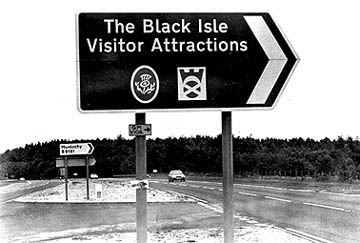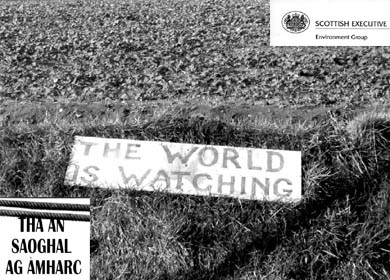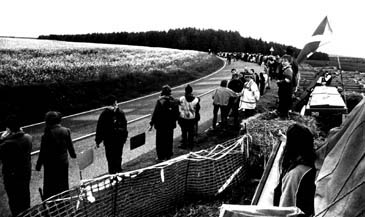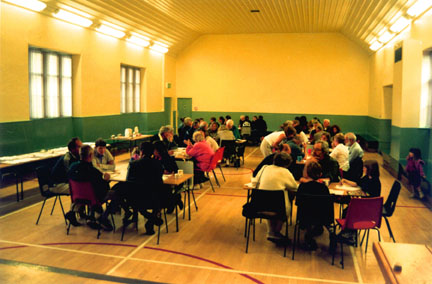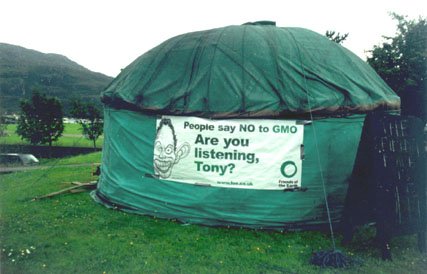 |
www.munlochygmvigil.org.uk CAMPAIGN HISTORY |
|
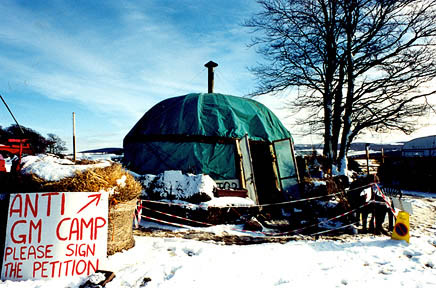
Munlochy GM Vigil Yurt, Winter 2001-2002 |
|
In August 2001 local people in the Highlands demonstrated on a 100 acre field being sown with GM oilseed rape. This was the second Farm Scale Evaluation, part of the wider UK programme, being held on a farm by Munlochy on the Black Isle. People dug their heels in and set up a round the clock vigil on a layby across the road from the GM site, which lasted for 343 days. The UK and devolved Scottish administration abandoned a projected third and final trial in the Highlands and to date the Highlands remains GM free. Both the Highland Council and the people adamantly intend to keep it so.
Munlochy GM Crop Sowing Protest - August 2001 In the course of this period over a Highland winter at the roadside, the vigil established both a habitable base and a functional, effective campaign from this rudimentary and rugged position a stone's throw from the GM crop. Support in the locality was overwhelming and never diminished or slackened. Funds were raised and a petition, with over six and a half thousand signatures from people who came to the vigil expressly to sign, was taken to the Scottish Parliament early in 2002.
A9 Dual Carriage Way North Bound Exit Sign To Munlochy And the Vigil, 2001-2002 As the result of a formidable campaign machinery that had harnassed considerable media and cross-party support, as well as a notably powerful local base, the Public Petitions Committee urgently brought the Munlochy GM Vigil petition to the attention of the Transport and Environment Committee who voted to plough up the Munlochy Farm Scale Evaluation. See:
The Scottish Executive refused to heed this but decided to conduct no further trials of GM crops in the Highlands.
Campaign Signs, 2001-2002 The Health and Community Care Committee also considered the petition and after an extensive inquiry produced a damning report on the health impacts of GM crops in January 2003, especially on the way government and its advisers had conducted the policy process and implementation of the Farm Scale Evaluations (see http://archive.scottish.parliament.uk/business/committees/historic/health/reports-03/her03-01-01.htm http://archive.scottish.parliament.uk/business/committees/historic/health/reports-03/her03-01-02.htm Once again, as if to reaffirm the report's findings, the Scottish Executive, just prior to the dissolution of parliament for the May 2003 Scottish elections, refused to acknowledge the criticsm and advice contained in the report of the parliamentary committee. This was something the Scottish Executive had never done before and a real indication of the cornered arrogance of government policy and the agricultural biotechnology interests enmeshed with it. With extensively deep-rooted cross-party political support in Scotland, the Munlochy GM Vigil and Information Centre has provided and continues to provide a cogent, articulate platform for the considerably potent challenge in Scotland and beyond to halt the open air, reckless deployment of GM crops.
Field Road Side Silent Protest - May 2002 During 2003, Munlochy GM Vigil involved themselves with the UK's GM Public Debate, setting up meetings in the Highlands and writing submissions to the science and economic strands of the debate. Whilst the Scotish Parliament effectively went into limbo from March (Easter holidays and pre-election period) to September (post-election and summer holidays), work with the Highland Council began to see it move towards adopting a GM-free zone policy. Lobbying of both the European Parliament and the European Commission was intensified to reflect the impending GM legislation on labelling, traceability and liabilty as well as directives concerned with seed purity. Responses to the results of the Farm Scale Evaluations and submissions to UK Parliamentary committee inquiries into these and the conduct of the GM Public Debate also enabled the Vigil to keep the pressure up on government and the agriculture-biotech lobby (see the Scotland, UK, Europe, International and Reports pages)
GM Nation? Public Debate, Munlochy Village Hall, July 2003
The Yurt in Ullapool for the debate, midsummer 2003 Action in the first quarter of 2004 saw the vigil deal with the build up to the UK government announcement on the commercial future of GM crops in the UK. The hesitancy of this announcement when it came, giving a provisional signal that one variety of GM maize could, with conditions attached, be cultivated and the subsequent withdrawal of that variety by Bayer-CropScience has shown that effective campaigning within a context that encompasses the political process in its broadest sense achieves consistent results. The task now more than ever relies on all campaigning strands to retain their grip. The campaign to ensure that GM-free feed fed to animals, thus ensuring GM-free animal products such as milk, is an important one (see things to do). As important is the need to keep vigilant and support the campaigns of local groups and ngos throughout the world. Significant gains have been won, and continue to be, on many fronts throughout the world but it is far from over. The work must go on, as it does. From spring 2004 to spring 2005 Munlochy GM Vigil has pushed on combining vigilance with intervention. The publication of the results of the Farm Scale Evaluations for the winter sown crop variety, GM herbicide tolerant oilseed rape, the crop that came to Munlochy and that was repulsed, acknowledges that adverse effects on the environment occur - the results of the final set of UK government GM trials published and peer reviewed show in their small way that the stand taken by so many and rapidly and intensely developed politically was more than justified. Not that the campaign needs such endorsements but for Scotland and the UK the likelihood of commercialised GM crops and food remains less and less probable. The signs are that with strong liability and coexistence legislation in place (an issue that has concerned the campaign and will continue to do so during 2006) and GM-free zones increasingly establishing themselves, that the tendency to push the commercial tide back is indeed achievable as well as necessary. Now, July 2006, still requires vigilance and intervention in Scotland, the UK and Europe; the guard must not be dropped; yet also an increased effort on the wider international front must be made and maintained. More campaign successes can and surely will follow. Scottish Executive Moratorium
|
|
For more campaign history see the Scotland page
|
top |
